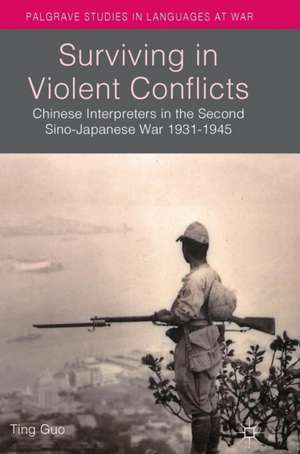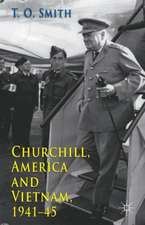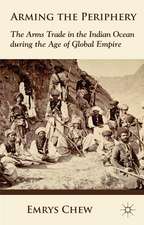Surviving in Violent Conflicts: Chinese Interpreters in the Second Sino-Japanese War 1931–1945: Palgrave Studies in Languages at War
Autor Ting Guoen Limba Engleză Hardback – 18 oct 2016
Din seria Palgrave Studies in Languages at War
- 15%
 Preț: 644.18 lei
Preț: 644.18 lei - 15%
 Preț: 643.34 lei
Preț: 643.34 lei -
 Preț: 389.70 lei
Preț: 389.70 lei -
 Preț: 385.62 lei
Preț: 385.62 lei - 15%
 Preț: 645.79 lei
Preț: 645.79 lei - 15%
 Preț: 588.04 lei
Preț: 588.04 lei -
 Preț: 336.14 lei
Preț: 336.14 lei - 15%
 Preț: 641.71 lei
Preț: 641.71 lei -
 Preț: 388.90 lei
Preț: 388.90 lei - 15%
 Preț: 587.53 lei
Preț: 587.53 lei - 18%
 Preț: 728.28 lei
Preț: 728.28 lei - 15%
 Preț: 636.45 lei
Preț: 636.45 lei - 18%
 Preț: 887.55 lei
Preț: 887.55 lei - 18%
 Preț: 945.62 lei
Preț: 945.62 lei - 18%
 Preț: 727.48 lei
Preț: 727.48 lei - 18%
 Preț: 953.03 lei
Preț: 953.03 lei - 18%
 Preț: 727.00 lei
Preț: 727.00 lei
Preț: 386.99 lei
Nou
Puncte Express: 580
Preț estimativ în valută:
74.05€ • 77.52$ • 61.27£
74.05€ • 77.52$ • 61.27£
Carte tipărită la comandă
Livrare economică 05-19 aprilie
Preluare comenzi: 021 569.72.76
Specificații
ISBN-13: 9781137461186
ISBN-10: 1137461187
Pagini: 224
Ilustrații: XIII, 200 p. 1 illus.
Dimensiuni: 148 x 210 x 18 mm
Greutate: 0.39 kg
Ediția:1st ed. 2016
Editura: Palgrave Macmillan UK
Colecția Palgrave Macmillan
Seria Palgrave Studies in Languages at War
Locul publicării:London, United Kingdom
ISBN-10: 1137461187
Pagini: 224
Ilustrații: XIII, 200 p. 1 illus.
Dimensiuni: 148 x 210 x 18 mm
Greutate: 0.39 kg
Ediția:1st ed. 2016
Editura: Palgrave Macmillan UK
Colecția Palgrave Macmillan
Seria Palgrave Studies in Languages at War
Locul publicării:London, United Kingdom
Cuprins
Introduction.- Chapter One: Responsibility and Accountablity: Military Interpreters and the Chinese Kuomintang Government.- Chapter Two: Political Beliefs or Practical Gains?: Interpreting for the Chinese Communist Party.- Chapter Three: Interpreting for the Enemy: Chinese/Japanese Interpreters and the Japanese Forces.- Chapter Four: A Case Study of Two Interpreters: Xia Wenyun and Yan Jiarui.- Conclusion.- Appendix I. Chronology of the Second Sino-Japanese War (1931–45).
Notă biografică
Ting Guo is Lecturer in the Department of Modern Languages, University of Exeter, UK. A specialist in translation history, she has written widely on the roles of Chinese translators and interpreters in twentieth century China. She has published articles in journals such as Literature Compass, Translation Studies, and Translation Quarterly.
Textul de pe ultima copertă
This book examines the relatively little-known history of interpreting in the Second Sino-Japanese War (1931-45). Chapters within explore how Chinese interpreters were trained and deployed as an important military and political asset by competing domestic and international powers, including the Chinese Nationalist Government (Kuomingtang), the Chinese Communist Party and Japanese forces. Drawing from a wide range of sources, including archives in mainland China and Taiwan, memoirs and interviews with former military interpreters, it discusses how the interpreting profession was affected by shifts of foreign policy and how interpreters’ professional habitus was formed through their training and interaction with other social agents and institutions. By investigating individual interpreters’ career development and border-crossing strategies, it questions the assumption of interpreting as an exclusive profession and highlights interpreters’ active position-taking as a strategy of self-protection, a route to power, or just a chance of a better life.
Ting Guo is Lecturer in the Department of Modern Languages, University of Exeter, UK. A specialist in translation history, she has written widely on the roles of Chinese translators and interpreters in twentieth century China. She has published articles in journals such as Literature Compass, Translation Studies, and Translation Quarterly.
Caracteristici
Offers a balanced and dispassionate analysis of a range of sources such as archives, personal interviews and personal memoirs of interpreters working in violent conflict zones Traces the social trajectory of the interpreters who worked within China during the Second Sino-Japanese War Argues that interpreting history in China has been simplified and idealized to fit the larger cultural discourse of nationalism














